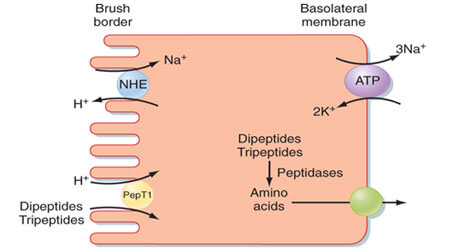Absorption of Proteins
The absorption of proteins takes place in the jejunum and the ileum of the small intestine. For this process, the energy in the form of ATP is required which is also utilized by the body during the protein synthesis. For the absorption of the amino acids, the body uses the carrier protein as the transport system. There is a specific carrier protein for each amino acid which is responsible for its transportation from the intestine to the mucosal cells.

Role of Minerals and Intestine for Protein Absorption
Potassium and sodium are the essential minerals that are required for the passing of the amino acids from the intestine through the villi and into the bloodstream. The absorption of these amino acids happens by the blood capillaries of the small intestine. Then they are carried through the liver to the blood by the general circulation. Dietary proteins are large and the complex molecules which cannot be absorbed by the intestine. For the absorption, the dietary proteins should be digested to the simpler molecules such as amino acids and are easily absorbed by the intestine. The small intestine is equipped with the brush borders that has the family of lactases and maltase which are integral membrane proteins and causes the hydrolysis of the luminal peptides and convert them to the very small peptides and the amino acids.
Assimilation of Proteins
The amino acids are never stored in the body, but they are taken up for the building of the proteins. Excess of the amino acids are converted to the fats and the glucose and then they are stored in these forms. This reaction is irreversible and can yield the amino acids, according to their needs and requirements. But for the conversion to glucose, the amino acids are first deaminated. The liver works as the chief site for the deamination of amino acids, which is a process that causes the removal of the amino group of the amino acids and produces the ammonia. Soon, this ammonia is converted to the urea which is filtered from the blood in the kidneys and is thus removed from the body. Just as the recycling of the plastic, for the manufacturing of new products the amino acids can also be recycled for making the new proteins. The process of protein turnover causes continuous breakdown and the making of new proteins in the body. The proteins are not assimilated and stored so it is essential to maintain the level of amino acids in the body by consuming protein-rich diets.